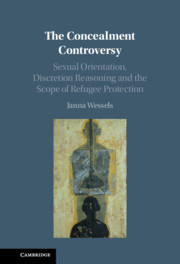 The Concealment Controversy
The Concealment Controversy France
from Part I - Tracing ‘Discretion’ Reasoning
Published online by Cambridge University Press: 19 July 2021
Chapter 4 analyses French sexuality-based asylum judgments. ‘Discretion’ reasoning emerges in the shape of a focus on behaviour: in French jurisprudence, claimants were traditionally protected only if they had sought to externally manifest their sexual orientation in their country of origin. Otherwise they were sent back to continued ‘discretion’. This ‘discretion’ reasoning ‘in reverse’ was barely affected by the three judgments on ‘discretion’. As the latter operated on a ‘discretion’ requirement, they appeared only marginally relevant to French jurisprudence, which undertook the opposite assessment of whether claimants had been open about their sexuality. The Qualification Directive in contrast has led to a reconceptualisation of the French social group definition. The public manifestation requirement was dropped, whereas under the new definition, claimants now need to ‘claim’ their sexual orientation and be perceived as a group by the surrounding society. Since claimants had been ‘outed’ in all reviewed judgments – and therefore presumably ‘claimed’ their sexual orientation, it is unclear how this definition plays out for claimants who have successfully concealed their sexual orientation in the past.
To save this book to your Kindle, first ensure no-reply@cambridge.org is added to your Approved Personal Document E-mail List under your Personal Document Settings on the Manage Your Content and Devices page of your Amazon account. Then enter the ‘name’ part of your Kindle email address below. Find out more about saving to your Kindle.
Note you can select to save to either the @free.kindle.com or @kindle.com variations. ‘@free.kindle.com’ emails are free but can only be saved to your device when it is connected to wi-fi. ‘@kindle.com’ emails can be delivered even when you are not connected to wi-fi, but note that service fees apply.
Find out more about the Kindle Personal Document Service.
To save content items to your account, please confirm that you agree to abide by our usage policies. If this is the first time you use this feature, you will be asked to authorise Cambridge Core to connect with your account. Find out more about saving content to Dropbox.
To save content items to your account, please confirm that you agree to abide by our usage policies. If this is the first time you use this feature, you will be asked to authorise Cambridge Core to connect with your account. Find out more about saving content to Google Drive.